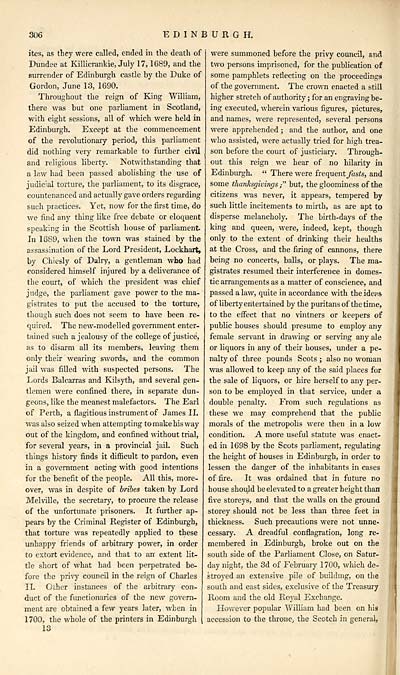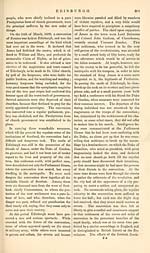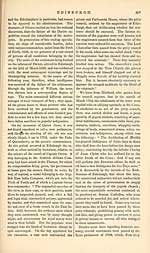Gazetteer of Scotland > Volume 1
(340) Page 306
Download files
Complete book:
Individual page:
Thumbnail gallery: Grid view | List view

306
EDINBURGH.
ites, as they were called, ended in the death of
Dundee at Killicrankie, July 17, 1689, and the
surrender of Edinburgh castle by the Duke of
Gordon, June 13, 1690.
Throughout the reign of King William,
there was but one parliament in Scotland,
with eight sessions, all of which were held in
Edinburgh. Except at the commencement
of the revolutionary period, this parliament
did nothing very remarkable to further civil
and religious liberty. Notwithstanding that
a law had been passed abolishing the use of
judicial torture, the parliament, to its disgrace,
countenanced and actually gave orders regarding
such practices. Yet, now for the first time, do
we find any thing like free debate or eloquent
speaking in the Scottish house of parliament
In 1689, when the town was stained by the
assassination of the Lord President, Lockhart,
by Chiesly of Dairy, a gentleman who had
considered himself injured by a deliverance of
the court, of which the president was chief
judge, the parliament gave power to the ma-
gistrates to put the accused to the torture,
though such does not seem to have been re-
quired. The new-modelled government enter-
tained such a jealousy of the college of justice,
as to disarm all its members, leaving them
only their wearing swords, and the common
jail was filled with suspected persons. The
Lords Balcarras and Kilsyth, and several gen-
tlemen were confined there, in separate dun-
geons, like the meanest malefactors. The Earl
of Perth, a flagitious instrument of James II.
was also seized when attempting to make his way
out of the kingdom, and confined without trial,
for several years, in a provincial jail. Such
things history finds it difficult to pardon, even
in a government acting with good intentions
for the benefit of the people. All this, more-
over, was in despite of bribes taken by Lord
Melville, the secretary, to procure the release
of the unfortunate prisoners. It further ap-
pears by the Criminal Register of Edinburgh,
that torture was repeatedly applied to these
unhappy friends of arbitrary power, in order
to extort evidence, and that to an extent lit-
tle short of what had been perpetrated be-
fore the privy council in the reign of Charles
IL Other instances of the arbitrary con-
duct of the functionaries of the new govern-
ment are obtained a few years later, when in
1700, the whole of the printers in Edinburgh
13
were summoned before the privy council, and
two persons imprisoned, for the publication of
some pamphlets reflecting on the proceedings
of the government. The crown enacted a still
higher stretch of authority ; for an engraving be-
ing executed, wherein various figures, pictures,
and names, were represented, several persons
were apprehended ; and the author, and one
who assisted, were actually tried for high trea-
son before the court of justiciary. Through-
out this reign we hear of no hilarity in
Edinburgh. " There were frequent fasts, and
some thanksgivings ,-" but, the gloominess of the
citizens was never, it appears, tempered by
such little incitements to mirth, as are apt to
disperse melancholy. The birth-days of the
king and queen, were, indeed, kept, though
only to the extent of drinking their healths
at the Cross, and the firing of cannons, there
being no concerts, balls, or plays. The ma-
gistrates resumed their interference in domes-
tic arrangements as a matter of conscience, and
passed a law, quite in accordance with the ideas
of liberty entertained by the puritans of the time,
to the effect that no vintners or keepers of
public houses should presume to employ any
female servant in drawing or serving any ale
or liquors in any of their houses, under a pe-
nalty of three pounds Scots ; also no woman
was allowed to keep any of the said places for
the sale of liquors, or hire herself to any per-
son to be employed in that service, under a
double penalty. Erom such regulations as
these we may comprehend that the public
morals of the metropolis were then in a low
condition. A more useful statute was enact-
ed in 1698 by the Scots parliament, regulating
the height of houses in Edinburgh, in order to
lessen the danger of the inhabitants in cases
of fire. It was ordained that in future no
house should be elevated to a greater height than
five storeys, and that the walls on the ground
storey should not be less than three feet in
thickness. Such precautions were not unne-
cessary. A dreadful conflagration, long re-
membered in Edinburgh, broke out on the
south side of the Parliament Close, on Satur-
day night, the 3d of February 1700, which de-
stroyed an extensive pile of building, on the
south and east sides, exclusive of the Treasury
Room and the old Royal Exchange.
However popular William had been on his
accession to the throne, the Scotch in general,
EDINBURGH.
ites, as they were called, ended in the death of
Dundee at Killicrankie, July 17, 1689, and the
surrender of Edinburgh castle by the Duke of
Gordon, June 13, 1690.
Throughout the reign of King William,
there was but one parliament in Scotland,
with eight sessions, all of which were held in
Edinburgh. Except at the commencement
of the revolutionary period, this parliament
did nothing very remarkable to further civil
and religious liberty. Notwithstanding that
a law had been passed abolishing the use of
judicial torture, the parliament, to its disgrace,
countenanced and actually gave orders regarding
such practices. Yet, now for the first time, do
we find any thing like free debate or eloquent
speaking in the Scottish house of parliament
In 1689, when the town was stained by the
assassination of the Lord President, Lockhart,
by Chiesly of Dairy, a gentleman who had
considered himself injured by a deliverance of
the court, of which the president was chief
judge, the parliament gave power to the ma-
gistrates to put the accused to the torture,
though such does not seem to have been re-
quired. The new-modelled government enter-
tained such a jealousy of the college of justice,
as to disarm all its members, leaving them
only their wearing swords, and the common
jail was filled with suspected persons. The
Lords Balcarras and Kilsyth, and several gen-
tlemen were confined there, in separate dun-
geons, like the meanest malefactors. The Earl
of Perth, a flagitious instrument of James II.
was also seized when attempting to make his way
out of the kingdom, and confined without trial,
for several years, in a provincial jail. Such
things history finds it difficult to pardon, even
in a government acting with good intentions
for the benefit of the people. All this, more-
over, was in despite of bribes taken by Lord
Melville, the secretary, to procure the release
of the unfortunate prisoners. It further ap-
pears by the Criminal Register of Edinburgh,
that torture was repeatedly applied to these
unhappy friends of arbitrary power, in order
to extort evidence, and that to an extent lit-
tle short of what had been perpetrated be-
fore the privy council in the reign of Charles
IL Other instances of the arbitrary con-
duct of the functionaries of the new govern-
ment are obtained a few years later, when in
1700, the whole of the printers in Edinburgh
13
were summoned before the privy council, and
two persons imprisoned, for the publication of
some pamphlets reflecting on the proceedings
of the government. The crown enacted a still
higher stretch of authority ; for an engraving be-
ing executed, wherein various figures, pictures,
and names, were represented, several persons
were apprehended ; and the author, and one
who assisted, were actually tried for high trea-
son before the court of justiciary. Through-
out this reign we hear of no hilarity in
Edinburgh. " There were frequent fasts, and
some thanksgivings ,-" but, the gloominess of the
citizens was never, it appears, tempered by
such little incitements to mirth, as are apt to
disperse melancholy. The birth-days of the
king and queen, were, indeed, kept, though
only to the extent of drinking their healths
at the Cross, and the firing of cannons, there
being no concerts, balls, or plays. The ma-
gistrates resumed their interference in domes-
tic arrangements as a matter of conscience, and
passed a law, quite in accordance with the ideas
of liberty entertained by the puritans of the time,
to the effect that no vintners or keepers of
public houses should presume to employ any
female servant in drawing or serving any ale
or liquors in any of their houses, under a pe-
nalty of three pounds Scots ; also no woman
was allowed to keep any of the said places for
the sale of liquors, or hire herself to any per-
son to be employed in that service, under a
double penalty. Erom such regulations as
these we may comprehend that the public
morals of the metropolis were then in a low
condition. A more useful statute was enact-
ed in 1698 by the Scots parliament, regulating
the height of houses in Edinburgh, in order to
lessen the danger of the inhabitants in cases
of fire. It was ordained that in future no
house should be elevated to a greater height than
five storeys, and that the walls on the ground
storey should not be less than three feet in
thickness. Such precautions were not unne-
cessary. A dreadful conflagration, long re-
membered in Edinburgh, broke out on the
south side of the Parliament Close, on Satur-
day night, the 3d of February 1700, which de-
stroyed an extensive pile of building, on the
south and east sides, exclusive of the Treasury
Room and the old Royal Exchange.
However popular William had been on his
accession to the throne, the Scotch in general,
Set display mode to: Large image | Transcription
Images and transcriptions on this page, including medium image downloads, may be used under the Creative Commons Attribution 4.0 International Licence unless otherwise stated. ![]()
| Gazetteers of Scotland, 1803-1901 > Gazetteer of Scotland > Volume 1 > (340) Page 306 |
|---|
| Permanent URL | https://digital.nls.uk/97428442 |
|---|
| Description | Volume I: Abbey to Glenartney. |
|---|---|
| Attribution and copyright: |
|
| Description | By Robert Chambers and William Chambers. Glasgow: Blackie & Son, 1838. 2 volumes. |
|---|---|
| Shelfmark | NF.1461.g.7 |
| Additional NLS resources: | |

